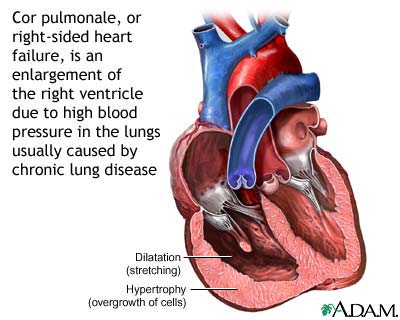Right heart failure
| Right heart failure | |
 | |
|---|---|
| ICD-10 | I26, I27 |
| ICD-9 | 415.0 |
| MeSH | D011660 |
|
Right heart failure Microchapters |
|
Diagnosis |
|---|
|
Treatment |
|
Case Studies |
|
Right heart failure On the Web |
|
American Roentgen Ray Society Images of Right heart failure |
For the WikiPatient page for this topic, click here
Editor-In-Chief: C. Michael Gibson, M.S., M.D. [1]
Synonyms and Keywords: Cor pulmonale, right ventricular failure, RV failure
Overview
Pathophysiology
Causes
Complications
Blood backups up into the system venous system, including the hepatic vein. Chronic congestion in the centrilobular region of the liver leads to hypoxia and fatty changes of more peripheral hepatocytes, leading to what's known as nutmeg liver. Left untreated, cor pulmonale can lead to right heart failure and death.
Treatment
Elimination of the cause is the most important intervention. In pulmonary embolism, thrombolysis (enzymatic dissolution of the blood clot) is advocated if there is dysfunction of the right ventricle. In COPD, long-term oxygen therapy may improve cor pulmonale.
Cor pulmonale may lead to congestive heart failure (CHF), with worsening of respiration due to pulmonary edema, swelling of the legs due to peripheral edema and painful congestive hepatomegaly. This situation requires diuretics (to decrease strain on the heart), sometimes nitrates (to improve blood flow), phosphodiesterase inhibitors like Sildenafil, tadalafil and occasionally inotropes (to improve heart contractility). CHF is a negative prognostic indicator in cor pulmonale.